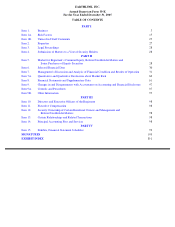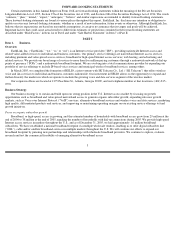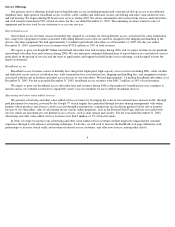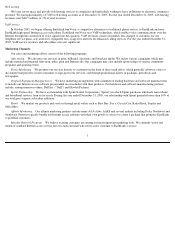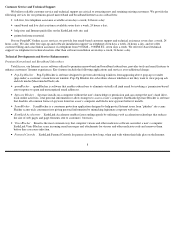Earthlink 2005 Annual Report Download - page 13
Download and view the complete annual report
Please find page 13 of the 2005 Earthlink annual report below. You can navigate through the pages in the report by either clicking on the pages listed below, or by using the keyword search tool below to find specific information within the annual report.
to offer products, features and services which enhance customers’ online experiences and thus create consumer demand.
Wholesale network access. In August 2003, the FCC issued its UNE Triennial Review Order which, among other things, eliminated line
sharing over a three-year transition period. Line sharing allowed CLECs such as Covad to purchase the High Frequency Portion of the Loop
(“HFPL”) from an ILEC for less than the cost of purchasing an entire line. Purchasing the HFPL as a separate Unbundled Network Element
(“UNE”) allows Covad to offer wholesale DSL services to us on favorable rates and terms. Various parties, including Covad, appealed the
FCC’s Order. In March 2004, the U.S. Court of Appeals for the District of Columbia (DC) Circuit overturned portions of the FCC’s Order but
upheld the elimination of line sharing. The FCC voted on permanent rules regarding UNE availability in December 2004 and released its
written order in February 2005, but this order did not address line sharing. We have a petition for reconsideration on line sharing still pending
before the FCC.
One of our largest providers of wholesale broadband access is Covad, a CLEC. Covad has agreements with varying terms with many of
the ILECs; however, if Covad is unable to continue to obtain reasonable line-
sharing rates due to legal and regulatory proceedings or otherwise,
its wholesale broadband access services may become uneconomic or it may cease selling wholesale broadband access services. In either event,
we may be able to use other wholesale broadband providers’ networks to continue to provide retail broadband services. Such events may cause
us to incur additional costs, to pay increased rates for wholesale broadband access services, to increase the retail prices of our broadband
service offerings and/or to discontinue providing retail DSL services.
In addition, the FCC has determined that ILECs are not required to offer CLECs such as Covad unbundled fiber-based and hybrid fiber-
based facilities, meaning that as the ILECs deploy fiber throughout their networks, access to those consumers could be limited. This decision
has been appealed and the outcome of the appeal could mean that access to consumers served by fiber could be limited, adversely impacting
our business in the event we are unable to reach agreements with carriers who have reached agreements with the ILECs for access to fiber-
based network facilities.
Other. In connection with the FCC’s approvals of the mergers of SBC Communications Inc. with AT&T Corp. and Verizon with MCI
Inc., the FCC required the merged entities, as a condition of approval, to offer DSL service on a stand-alone basis without requiring in-region
customers to also purchase circuit-switched voice telephone service. The FCC also required the merged companies to hold rates for certain
unbundled network elements and special access services constant through 2008 and to agree to Internet neutrality principles that ensure
consumer access to lawful Internet content, applications, services and devices. The availability of stand-alone DSL services provides us with
another avenue to reach consumers. The adoption of enforceable net neutrality principles provides us with regulatory recourse in instances of
discrimination.
Broadband Access Agreements
We have agreements with varying terms with all of our significant broadband network providers. Our largest providers of broadband
connectivity are Covad and Time Warner Cable. We also do lesser amounts of business with a wide variety of local, regional and other national
providers. The following table summarizes the expiration dates for these agreements:
12
Contract Expiration
Broadband Network Provider
Month
Year
Covad Communications Group, Inc.
April
2006
Comcast Corporation
June
2006
Subsidiaries of AT&T, Inc.
August
2006
Time Warner Cable and Bright House Networks
December
2006
Verizon Communications Inc.
December
2007
Qwest Corporation
February
2008
BellSouth Corporation
December
2008


